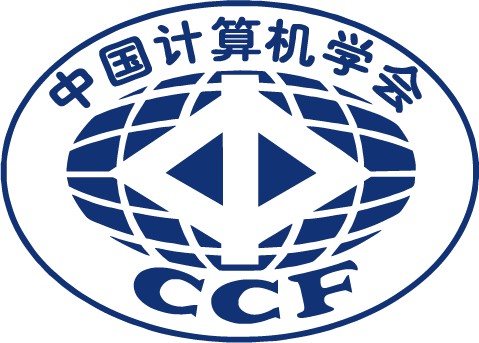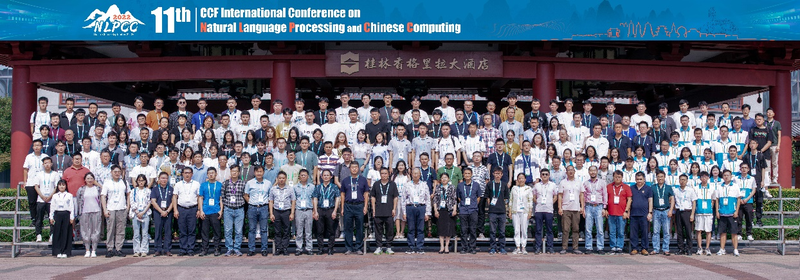Deadline Extended| NLPCC 2023 Call For Papers
The 12th CCF International Conference on Natural Language Processing and Chinese Computing (NLPCC 2023) will take place in Foshan City during October 12-15, 2023.
Considering the recent pandemic outbreak that has impacted some authors, we have decided to postpone the NLPCC 2023 submission deadline to May 18, 2023.
Paper Submission Deadline (for both English and Chinese tracks): May 15, 2023 May 18, 2023 (extended)
Paper Submission Website (for both English and Chinese tracks): https://www.softconf.com/nlpcc/Main-2023
NLPCC 2023 welcomes original technical papers on new concepts, innovative research, systems, standards, resources & evaluation, applications, and industrial case studies related to NLP & CC. Authors are invited to submit complete and unpublished papers in English or Chinese in the following categories:
◇ Applications/tools
◇ Empirical/data-driven approaches
◇ Resources and evaluation
◇ Theoretical
◇ Survey papers
Papers currently under review in other conferences or journals are acceptable; however, commitment to the conference must be made upon acceptance.
Relevant topics of NLPCC 2023 include, but are not limited to, the following:
◇ Computational Social Science and Social Media
◇ Dialogue and Interactive Systems
◇ Discourse and Pragmatics
◇ Ethics and NLP
◇ Information Extraction and Knowledge Acquisition
◇ Information Retrieval and Text Mining
◇ Interpretability and Analysis of Models for NLP
◇ Linguistic Theories, Cognitive Modeling and Psycholinguistics
◇ Machine Learning for NLP
◇ Machine Translation and Multilinguality
◇ NLP Applications
◇ Phonology, Morphology and Word Segmentation
◇ Question Answering
◇ Resources and Evaluation
◇ Semantics
◇ Sentiment Analysis
◇ Speech and Multimodality
◇ Syntax: Tagging, Chunking and Parsing
◇ Text Summarization and Generation
◇ Large Language Models
Submission Guidelines
The proceedings of the conference will be published as a volume in the Springer LNAI series (EI & ISTP indexed, for English papers), and the ACTA Scientiarum Naturalium Universitatis Pekinensis (EI and Scopus indexed, for Chinese papers), respectively. English submissions should follow the LNCS formatting instructions. The maximum paper length is 12 pages (including references and appendix). The submissions must therefore be formatted in accordance with the standard Springer style sheets ([LaTeX][Microsoft Word]). Submissions in Chinese should follow the formatting instructions of the ACTA Scientiarum Naturalium Universitatis Pekinensis [Format Template], without exceeding ten (10) pages (including references) in A4 (210 × 297 mm) size. All submissions should be prepared in the PDF format. A few selected papers will be recommended to be published in IEEE Transactions on Big Data or AI Open.
Manuscripts (including both English and Chinese papers) should be submitted electronically through the Softconf START conference management system https://www.softconf.com/nlpcc/Main-2023. After logging in, please click the "make a new submission" button, and select the corresponding link according to your paper's language. Email submissions will not be accepted. Authors of Chinese submissions are required to provide Chinese titles in the submission system.
Double-Blind Reviewing
Anonymity Requirements for Double-Blind Reviewing:
Every research paper submitted to NLPCC 2023 will undergo a "double-blind" reviewing process: the PC members and referees who review the paper will not know the identity of the authors. To ensure anonymity of authorship, authors must prepare their manuscript as follows:
1. Authors' names and affiliations must not appear on the title page or elsewhere in the paper.
2. Funding sources must not be acknowledged on the title page or elsewhere in the paper.
3. Research group members, or other colleagues or collaborators, must not be acknowledged anywhere in the paper.
4. The paper's file name must not identify the authors of the paper. It is strongly suggested that the submitted file be named with the assigned submission number.
5. You must also use care when referring to related previous work, particularly your own work, in the paper. For example, if you are Jane Smith, the following text gives away the authorship of the submitted paper:
In our previous work [1,2], we presented two algorithms for ... In this paper, we build on that work by ...
Bibliography
[1] Jane Smith, "A Simple Algorithm for ...," Proceedings of ACL 2007, pp. 1-8.
[2] Jane Smith, "A More Complicated Algorithm for ...," Proceedings of ACL 2008, pp.33-40.
The solution is to reference your past work in the third person (just as you would any other piece of work that is related to the submitted paper). This allows you to set the context for the submitted paper, while at the same time preserving anonymity:
In previous work [1,2], algorithms were presented for ... In this paper, we build on that work by ...
Bibliography
[1] Jane Smith, "A Simple Algorithm for ...," Proceedings of ACL 2007, pp. 1-8.
[2] Jane Smith, "A More Complicated Algorithm for ...," Proceedings of ACL 2008, pp.33-40.
It is the responsibility of authors to do their very best to preserve anonymity. Papers that do not follow the guidelines here, or otherwise potentially reveal the identity of the authors, are subject to rejection without review.
Important dates
◇ Paper Submission Deadline: May 15, 2023 May 18, 2023 (extended)
◇ Paper Notification: July 17, 2023
◇ Camera-ready Deadline: August 1, 2023
◇ Tutorials: October 12-13, 2023
◇ Main Conference: October 14-15, 2023
All deadlines are 23:59 PM, Beijing Time.
Organization
◇ Organizer:
● China Computer Federation (CCF)
◇ Hosts:
● South China Normal University
◇ Publishers:
● Lecture Notes on Artificial Intelligence (LNAI), Springer Verlag
● ACTA Scientiarum Naturalium Universitatis Pekinensis
◇ General Chairs:
● Rada Mihalcea, University of Michigan
● Hang Li, ByteDance Technology
◇ PC Chairs:
● Fei Liu, Emory University
● Nan Duan, Microsoft Research Asia
◇ Student Workshop Chairs:
● Jing Li, The Hong Kong Polytechnic University
● Jingjing Wang, Soochow University
◇ Evaluation Chairs:
● Yunbo Cao, Tencent
● Piji Li, Nanjing University of Aeronautics and Astronautics
◇ Tutorial Chairs:
● Zhongyu Wei, Fudan University
● Zhaochun Ren, Shandong University
◇ Publication Chairs:
● Yu Hong, Soochow University
● Qingting Xu, Soochow University
◇ Journal Coordinator:
● Yunfang Wu, Peking University
◇ Conference Handbook Chair:
● Leixin Du, South China Normal University
◇ Sponsorship Chairs:
● Min Zhang, Harbin Institute of Technology (Shenzhen)
● Haofen Wang, Tongji University
● Ruifeng Xu, Harbin Institute of Technology (Shenzhen)
◇ Publicity Chairs:
● Benyou Wang, The Chinese University of Hong Kong (Shenzhen)
● Shen Gao, Shandong University
● Xianling Mao, Beijing Institute of Technology
◇ Organization Chairs:
● Biqin Zeng, South China Normal University
● Yi Cai, South China University of Technology
● Xiaojun Wan, Peking University
◇ Treasurer:
● Yajing Zhang, Soochow University
● Xueying Zhang, Peking University
◇ Webmaster:
● Hui Liu, Peking University
◇ Area Chair:
Dialogue Systems
● Weinan Zhang, Harbin Institute of Technology
● Lizi Liao, Singapore Management University
Fundamentals of NLP
● Wenliang Chen, Soochow University
● Wenpeng Yin, Pennsylvania State University
Information Extraction and Knowledge Graph
● Xianling Mao, Beijing Institute of Technology
● Muhao Chen, University of Southern California
Machine Learning for NLP
● Peng Zhang, Tianjin University
● Lingpeng Kong, The University of Hong Kong
Machine Translation and Multilinguality
● Tong Xiao, Northeastern University
● Junjie Hu, University of Wisconsin-Madison
Multimodality and Explainability
● Chenfei Wu, Microsoft Research Asia
● Wenhu Chen, University of Waterloo
NLP Applications and Text Mining
● Rui Yan, Renmin University of China
● Kaiqiang Song, Tencent AI Lab
Question Answering
● Qi Zhang, Fudan University
● Xinya Du, University of Texas at Dallas
● Zhen Wang, Ohio State University
Large Language Models
● Yanyan Zhao, Harbin Institute of Technology
● Jiacheng Xu, Salesforce AI Research
Summarization and Generation
● Jiajun Zhang, Chinese Academy of Sciences
● Yue Dong, University of California, Riverside
Contact
If you have any questions about paper submission, please contact Program Co-Chairs via fei.liu@emory.edu and nanduan@microsoft.com. For more information about the conference, please email to nlpcc@pku.edu.cn.
NLPCC
The CCF International Conference on Natural Language Processing and Chinese Computing (NLPCC) is the annual meeting of CCF-NLP (Technical Committee of Natural Language Processing, China Computer Federation). NLPCC is a leading international conference specialized in the fields of Natural Language Processing (NLP) and Chinese Computing (CC). NLPCC is in the list of CS conferences recommended by CCF. It serves as a main forum for researchers and practitioners from academia, industry, and government to share their ideas, research results and experiences, and to promote their research and technical innovations in the fields. Previous NLPCC conferences were successfully held in Beijing (2012), Chongqing (2013), Shenzhen (2014), Nanchang (2015), Kunming (2016), Dalian (2017), Hohhot (2018), Dunhuang (2019), Zhengzhou (2020), Qingdao (2021), and Guilin (2022).
Today, NLP and CC technologies are among the most active research and development areas due to the rapid advancement of the Internet as well as the worldwide proliferation of mobile devices and social media. The fields are facing many new challenges arising from intelligent applications and big data, such as business intelligence, social analytics, etc.
 返回首页
返回首页









